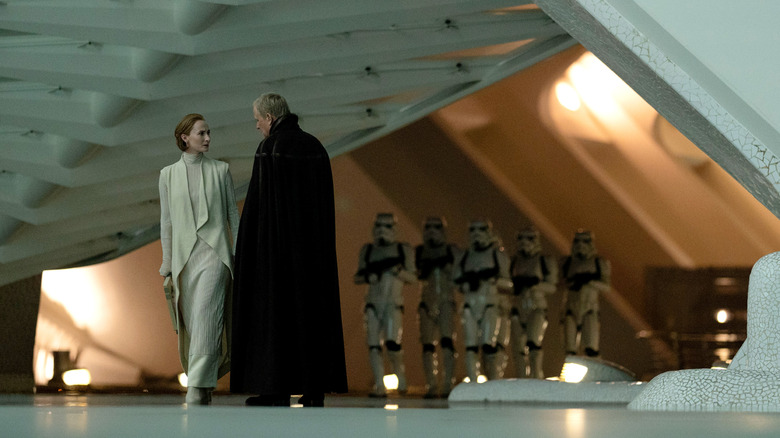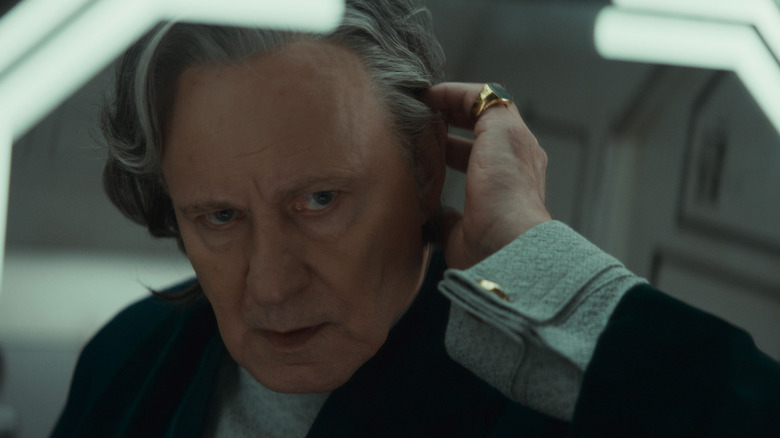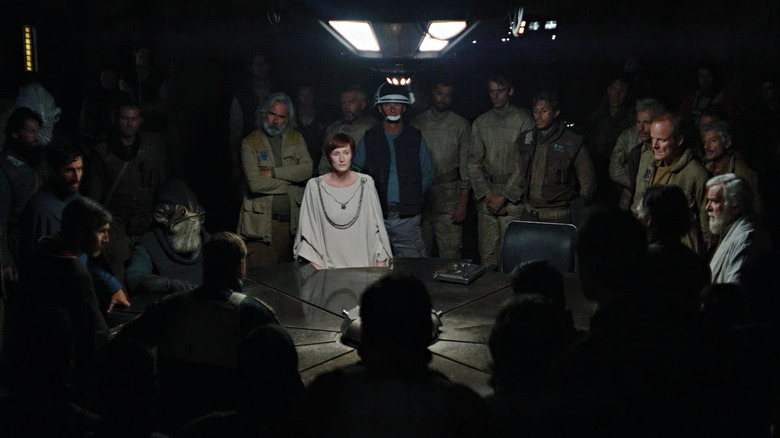Andor Season 2 Tragically 'Erases' The True Creator Of The Rebel Alliance
Major spoilers ahead for "Andor" season 2, up to the series finale.
"Andor" is not only the best "Star Wars" experiment in decades, it's arguably the timeliest and most poignant TV show currently airing. This is a harrowing portrayal of the evils of fascism and how genocide can happen right under everyone's noses. It is also a phenomenal story about the cost of revolution and the sacrifices made in the fight against tyranny.
Showrunner Tony Gilroy builds on the world introduced in "Star Wars: Rogue One," which showed us the dirty side of rebellion: the assassinations, the spying, and the mistrust. It is a show about the extraordinary effort required to start the spark that will eventually light the fire that will burn the Empire down. We've seen the idealism of Karis Nemik (Alex Lawther), who genuinely believed in the purity of the struggle and tried to inspire others with his manifesto. We've also learned more about Saw Gerrera (Forest Whitaker) and how his experiences in the Clone Wars turned him into an extremist who only sees the end goal.
As "Andor" approaches the start of "Rogue One" in its second season, the rebellion grows from random acts of insurrection to an organized alliance with ranks, a hierarchy, and a proper base. We've seen Mon Mothma (Genevieve O'Reilly) finally step out from the shadows and abandon Coruscant to become a public leader of the rebellion. We've watched the establishment of a rebel base on Yavin IV, and witnessed the Ghorman massacre that inspired countless people to join the cause.
By the final three episodes of "Andor" season 2, the Rebel Alliance has become the one we know from the original trilogy: a military force that defeats the Empire and restores the Republic (for a little while). But this is also the Rebel Alliance that makes many mistakes — like almost blowing its chance at getting the Death Star plans, or erasing one of the founding fathers of the rebellion from history: Luthen Rael.
Luthen Rael wasn't perfect, but his investment in the rebellion was epic
Stellan Skarsgård's Luthen Rael is many things. He's a man of great fashion sense, a giver of incredible speeches, and a burner of his life for sunrises he never got to see. Luthen was always the one person fully aware of the sacrifices required for the cause: a man willing to accept that he probably wouldn't survive to see the rebellion's victory or reap any rewards from it, who nonetheless devoted his life to building that victory.
In episode 10, Luthen learns of the Death Star from Lonni Jung (Robert Emms) — another unsung hero of the rebellion — and sacrifices himself so Kleya (Elizabeth Dulau) can deliver that vital information to the Rebel Alliance. And yet, the moment they receive the intel in the series finale, Rebel Command (mostly Bail Organa) immediately refuses to believe it, and call Luthen a paranoid fool. At least Cassian (Diego Luna) calls them out on it, recognizing that the people who now run the rebellion have given up a fraction of Luthen's sacrifice.
Granted, by the time we see the Rebel Alliance base on Yavin IV in episode 11, Luthen has long been distanced from the rest of the rebellion. His inability to compromise or to trust others alienated him from the very thing he helped create. Luthen was right in his speech to Lonni that his anger, his ego, his unwillingness to yeld and his eagerness to fight set him on a path from which there was no escape. Luthen built the bridges between people and groups that eventually resulted in the Rebel Alliance, but he also destroyed any bridge that would connect that work to him. Now? All that work is erased from the annals of Rebel history.
The Rebel Alliance was very flawed
Between "Rogue One" and "Andor," Tony Gilroy really has made it a point to show the rebellion being hampered by the cowardly, spineless politicians of Rebel Command — yet another way the show is quite timely. We have seen plenty of stories (real and fictional) about the folly of forming a government with soldiers, but "Andor" also shows the problem of politicians leading a rebel army.
It's incredibly poignant that the last 3 episodes show just how much Luthen distanced himself from the tebellion, only for episode 12 to then flip that and show that Rebel Command distanced itself from every cell that came before it in an attempt to gain legitimacy. They erased Luthen from the history books, and alienated Saw Gerrera by sending spies to him. This is how we end up with a relatively black-and-white conflict in the first "Star Wars," because Rebel Command worked tirelessly in painting a picture of their organization as pure and clean-cut. But we have seen otherwise. It wasn't clean, it wasn't pretty. The history of the rebellion was messy, ugly, and violent, with many moving parts that entered and exited the story, and did bad things in the name of good.
We saw this propaganda at work in episode 9 right after Mon Mothma gave her speech. In the episode, we hear that Rebel Command wants to "rewrite the story" and have Mon deliver a second speech after her Senate one, and arrive at the Rebel base on Yavin IV triumphant with a Rebel escort. This was their way of erasing Cassian and Luthen's role in Mon's escape, making it look like a planned and heroic endeavor rather than a desperate and ugly fight to escape the Senate building. It made the Yavin IV cell the only legitimate face of the Rebellion, ignoring everyone that came before.
Just like "Rogue One" was all about showing the sacrifices people made for the rebellion and shining a light on the names that were forgotten by history, "Andor" tells the untold story of the true father of the rebellion. The galaxy far, far away may not know his name, but they owe everything to Luthen Rael.


